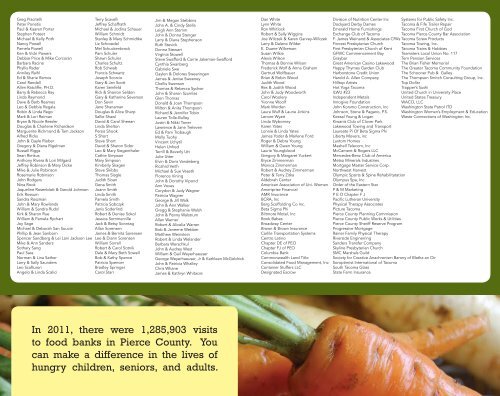Sustenance - Emergency Food Network
Sustenance - Emergency Food Network
Sustenance - Emergency Food Network
You also want an ePaper? Increase the reach of your titles
YUMPU automatically turns print PDFs into web optimized ePapers that Google loves.
Next Generation Growth<br />
at Mother Earth Farm<br />
Maybe it’s true that the apple doesn’t fall<br />
far from the tree. This is certainly the case<br />
at Mother Earth Farm, where in January,<br />
Canyon Little succeeded Carrie Little as<br />
Farm Manager.<br />
We are happy to welcome Canyon in his<br />
new role, and even happier that Carrie<br />
will stay involved with farm activities,<br />
including caring for the 8 bee hives that<br />
keep our produce bountiful.<br />
Canyon spent the past two years learning the “ins and outs” of EFN’s lush,<br />
eight-acre organic farm, which provides 150,000 pounds of produce annually to<br />
roughly 27 food banks. These programs receive the food on the same day that<br />
it is harvested, so hungry families and individuals in Pierce County often receive<br />
better fruits and vegetables than the average person could purchase in the store.<br />
Growing up, Canyon’s mom always had gardens, she was always opposed to<br />
genetically modifi ed produce, and she taught Canyon from a young age the<br />
importance of eating healthy and organically farmed food. The Littles settled<br />
in Puyallup and Tacoma when Canyon was 9 years old. He attended Western<br />
Washington University where he received a BA in Business with a concentration<br />
in Marketing. After managing some retail stores, he went to UW-Tacoma for a<br />
post-bach in environmental studies. When he fi nished school in 2009, he spent<br />
time helping at Mother Earth Farm, where he had volunteered since 2001. Carrie<br />
needed a farm assistant, and after a search, Helen McGovern, submitted Canyon’s<br />
name to the Board.<br />
He learned about things like soil structure, crop rotation, cover crops, drip tape<br />
irrigation, harvesting seeds, seed germination, pruning fruit trees (thinning cuts<br />
and leading cuts), bees, cross pollination, and more, all of which prepared him to<br />
take over the farm when Carrie retired to work more on her family farm. Canyon<br />
wakes early each morning to grab the 6:15 bus from Mercer Island to King Street<br />
Station. The 6:50 Sounder Train gets him to Sumner, where he then bikes 25-35<br />
minutes to the farm at 8am. At 4pm, he hops on his bike to return home.<br />
Canyon says he is very optimistic about his new role at Mother Earth Farm<br />
“because it has so much potential to have an impact on the lives of people in<br />
need.” His goals are to increase production from 150,000 pounds of vegetables,<br />
fruits, and honey to 200,000 pounds annually. To do this, the farm will harvest on<br />
more days, use more volunteers, and work more closely with the Pierce County<br />
Gleaning Project coordinator. As always, Mother Earth Farm will rely heavily on<br />
a core of 8-10 women from the Washington Corrections Center for Women. For<br />
years, this group has provided the core hours and skills needed to keep farm<br />
operations going, receiving college credit for their efforts.<br />
At EFN’s 30th Anniversary Breakfast on May 2, our community recognized Carrie<br />
with the David P. Ottey Lifetime Achievement Award for her work at Mother Earth<br />
Farm. She and David were a part of the farm from its roots.<br />
Distribution Centers<br />
don’t have farms.<br />
That was the way it<br />
had always been until a<br />
meeting took place over<br />
breakfast at a restaurant in<br />
Bonney Lake in March of<br />
1999. That meeting was<br />
between Doreen Johnson<br />
- the grandmother of an<br />
EFN volunteer who owned<br />
eight acres of farmland<br />
located between Sumner<br />
and Orting, and past EFN<br />
Director, David Ottey.<br />
The land in question was part of twenty acres that had been “in the family” for<br />
more than 50 years, providing the owner’s family with vegetables during the time<br />
Doreen grew up and also serving as a source of income from vegetables sold at<br />
the Tacoma Market where her father dropped them off each morning on his way<br />
to work at The News Tribune. After Doreen’s parents died, the land was split into<br />
eight acres owned by Doreen, ten acres owned by her brother, and two acres that<br />
were sold. For more than a decade, Doreen leased her acreage to a valley grower,<br />
but decided that she wanted the land to do “something special” and offered to<br />
lease it at minimal cost to provide food for those in need. Although a radical idea<br />
in the larger emergency food community, EFN was well aware of the “seed to the<br />
table” approach of providing low-income folks with food. A deal was cut allowing<br />
for the project to be attempted, once two years of funding specifi c<br />
continued on next page


